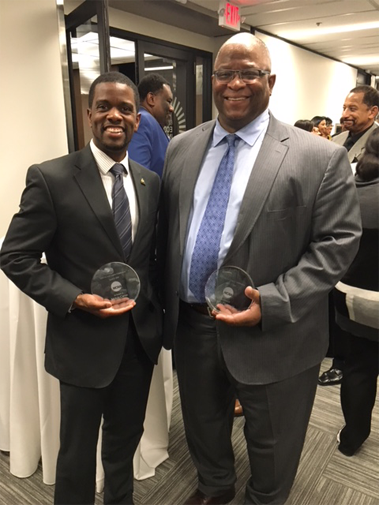-By Ray Richardson
 At the first official event of the 2019 NCAA men’s basketball Final Four Wednesday night, longtime KMOJ sports broadcaster and Minnesota Spokesman-Recorder columnist Larry Fitzgerald was referred to as a “living legend.”
At the first official event of the 2019 NCAA men’s basketball Final Four Wednesday night, longtime KMOJ sports broadcaster and Minnesota Spokesman-Recorder columnist Larry Fitzgerald was referred to as a “living legend.”
Fitzgerald, 62, was among seven sports and civic leaders in Minneapolis-St. Paul honored with an NCAA Legacy Award for distinguished achievement and community service.
“I’ve been as critical of the NCAA as anybody in the media,” Fitzgerald said. “When I got the call to tell me about this, I said ‘You got to be kidding me’. I was floored.”
More than 200 people attended the event at the Center for Economic Inclusion in downtown St. Paul. The NCAA conducts its annual Legacy Celebration in Final Four cities to recognize local “community champions.” The concept started at the 2014 Final Four in Arlington, Texas.
Other honorees included St. Paul Mayor Melvin Carter, former NBA player Devean George, Minneapolis North boys basketball coach Larry McKenzie, Minnesota hall of fame high school referee Jim Robinson, Robbinsdale Cooper football coach Tony Patterson and Marvin Anderson, founder of the Rondo Days Festival in St. Paul.
Singer and actor T Mychal Rambo, master of ceremonies for the event, concluded his remarks on each recipient by calling them an “NCAA living legend.” Each honoree was presented a glass plaque by Katrice Albert, Executive Vice President for Inclusion and Human Resources for the NCAA.
Fitzgerald was joined by his wife, Sharrie, and his step-daughter Ikella, 17, a senior at Minneapolis Southwest High School. He said he received the surprising call from the NCAA three weeks ago informing him that he had been selected for the organization’s Legacy Award.
“When people like the NCAA want to recognize your work, it rocks you when you hear something like that,” Fitzgerald said. “This ranks pretty high among the milestones in my life.”
Fitzgerald received the Heritage Award at the 2003 National Baptist Convention in Minneapolis for distinguished service in journalism.
Among Fitzgerald’s many career highlights, he’s the first sports journalist to cover his son, Larry Fitzgerald Jr., in a Super Bowl. Fitzgerald Jr., a wide receiver for the Arizona Cardinals, was a key performer for the Cardinals in the 2008 Super Bowl against the Pittsburgh Steelers.
After the award presentations, the honorees remained seated in front of the audience to give Albert an opportunity to ask them questions. Each honoree was asked to respond to three questions, allowing the audience to hear what contributed to their success.
Fitzgerald talked about his parents, both deceased, when asked to identify ‘Who inspired him the most?’
“My parents moved to Chicago in the 1950s to escape Mississippi,” Fitzgerald said. “They told me about all the tough times they had there…how the Klan used to throw things at them. They had to overcome a lot. They made it possible for me to have a better life.”
Fitzgerald’s journalism inspiration came from Wendell Smith, an African-American sportswriter and TV broadcaster in Chicago in the 1960s. Smith, who helped advocate for Jackie Robinson to break major league baseball’s color barrier, was one of the first African-American sports journalists in the country to work for a major TV station. Smith was one of the main sports anchors at WGN-TV.
“Watching Smith as a kid made a great impression on me,” Fitzgerald said.
Fitzgerald credits the Spokesman-Recorder for providing him the “vehicle” to give readers a perspective they might not get in mainstream publications. The irony of Fitzgerald’s Legacy Award is shaped by the numerous occasions he has challenged the NCAA.
In the 1980s, the NCAA implemented Proposition 42 and Proposition 48, policies that kept high school student-athletes from receiving athletic scholarships if they failed to meet certain academic testing standards. Fitzgerald was among the critics who believed the NCAA’s academic policies put African-American athletes at a disadvantage because of questionable high school educational systems.
The policies led to discrimination complaints and Fitzgerald was among journalists nationwide who wrote about it. By the early 1990s, Prop 42 and Prop 48 were no longer a part of the NCAA’s academic playbook.
“I always wanted to bring a social consciousness and commentary to my reporting,” said Fitzgerald, who also has challenged the NBA, NFL and major league baseball on social issues. “I wanted to take care of my community.”